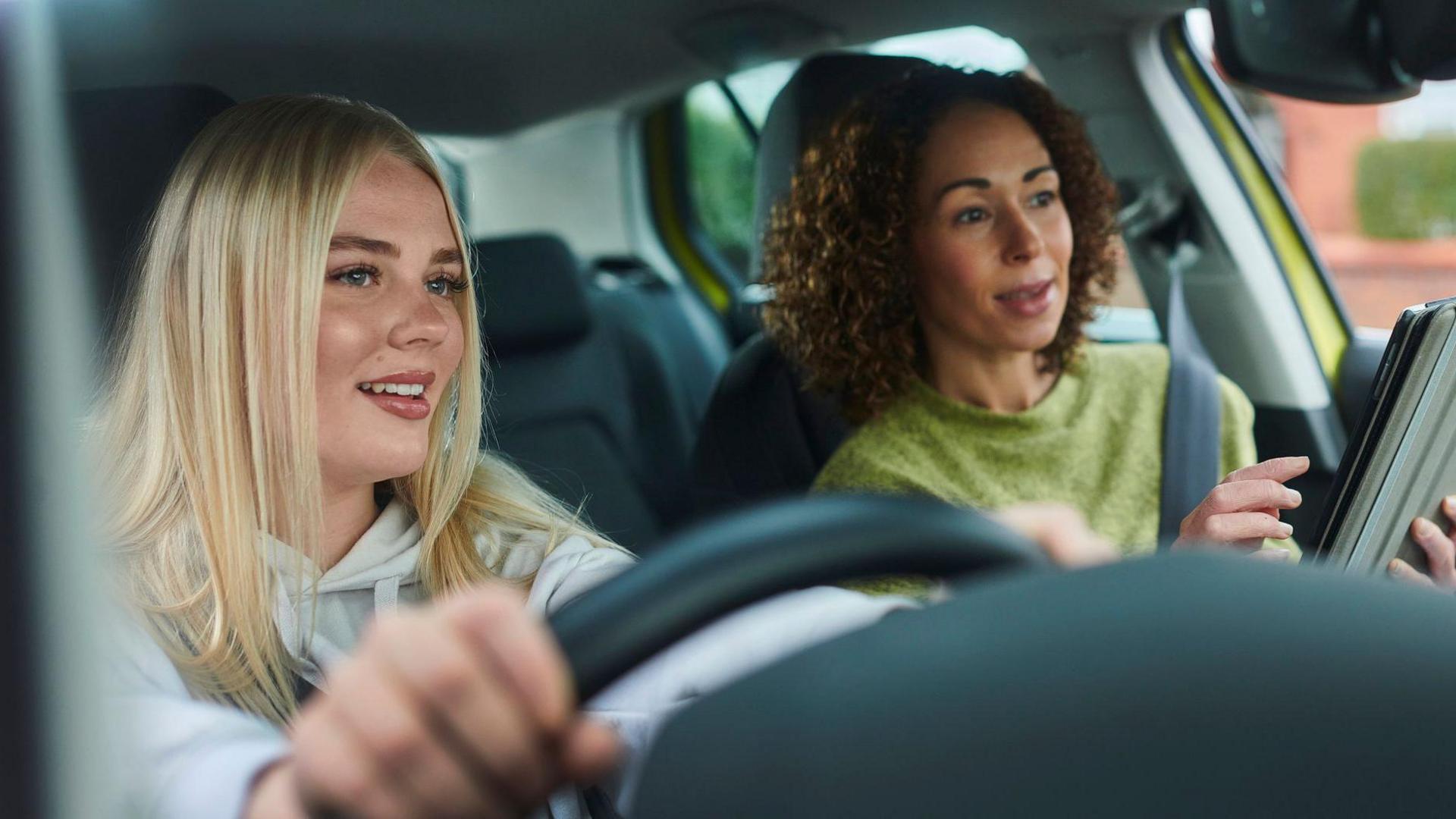New young drivers should not carry under-21s as passengers - AA

- Published
Drivers aged under 21 who have just passed their tests should be prevented from carrying passengers of a similar age for their first six months as drivers, the AA has said.
It suggested tougher rules that would also see them handed six penalty points for not wearing a seatbelt during the period - meaning they could lose their licence.
The motoring organisation says the proposal for a particular type of licence targeted at new, young drivers has the potential to prevent 934 serious injuries and save 58 lives on UK roads each year.
Similar measures - known as graduated driving licensing (GDL) - already exist in Northern Ireland. The Department for Transport (DfT) has said it is not currently considering the measures for elsewhere in the UK.
Learner driver fails 59 theory tests before pass
- Published4 December 2023
'Dodgy' websites re-selling driving tests for profit
- Published12 August 2024
Young drivers risk fraud to save on insurance cost
- Published29 January 2024
If it were brought in across the UK, it would mean young drivers marking their vehicles with G plates - with a failure to display them punishable with three points on their licence.
While the proposed changes focus on younger drivers, in other jurisdictions - like Canada - all new drivers are subject to restrictions after passing their test, regardless of age.
Crystal Owen's 17-year-old son Harvey died in a car crash in November 2023 along with three of his friends while on a camping trip in Gwynedd, north Wales.
Now a campaigner, she told BBC Radio 4's Today programme that bringing in this new type of licence would "massively help" reduce incidents on the roads.
"There are not many times when having to take your friends in the car is a necessity. It’s to protect drivers, it’s to save lives, and what is the alternative?" she said.
Mrs Owen said she was constantly hearing of car crashes involving "young people with their whole lives ahead of them like my son".
She added: "Their lives [are] gone - for what? For the sake of a few inconveniences for a very short time?"
In Northern Ireland, where GDL already exists, drivers must display amber R plates for one year the date of passing their test. There had been plans to introduce a ban by 2020 on drivers under the age of 21 from carrying passengers of a similar age for six months, but it has not happened yet.
Currently in the UK, new drivers' licences can be cancelled if they get six or more points within two years of passing their test, whereas more experienced drivers can be banned with 12 or more penalty points within three years.
Figures from the DfT show 290 people were killed and 4,669 were seriously injured in crashes on Britain's roads last year involving at least one driver aged 17-24.
Speaking to BBC Radio 5Live, Jack Cousens, the AA's head of road policy, said what was noticable across countries with the policy in place was "a reduction of death and serious injuries to younger drivers and their passengers" by 20% to 40%.
Mr Cousens said that while the government was bringing forward a road safety strategy, at the moment it was "not convinced" of the need for GDL.
"We feel that something has to be done, so we’re going to keep banging this drum," he said. "Hopefully the government will change tack and see that, actually, we need to make some changes for younger drivers."
Mrs Owen said that road deaths receive less attention than certain types of violence crime, and that ministers "seem to be just not listening to the advice".
"Does it take for one of them to lose their own children to put this into place? Because I can guarantee they would [if that happened]."
A DfT spokesperson said: "Every death on our roads is a tragedy and our thoughts remain with the families of everyone who has lost a loved one in this way.
"Whilst we are not considering graduated driving licences, we absolutely recognise that young people are disproportionately victims of tragic incidents on our roads, and we are considering other measures to tackle this problem and protect young drivers."
Get in touch
Are you a new driver, or a driver aged under-21?
Related topics
You may also be interested in
- Published21 October 2024

- Published21 October 2024

- Published21 October 2024

- Published21 October 2024
